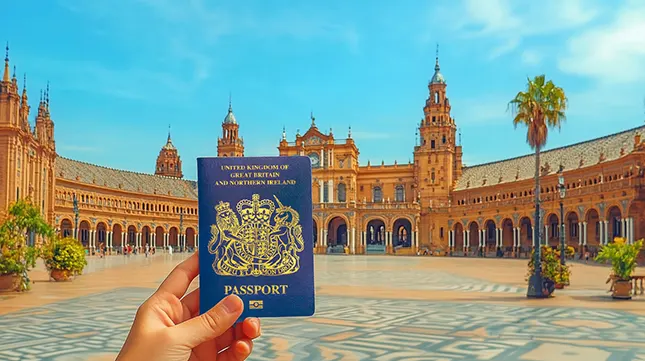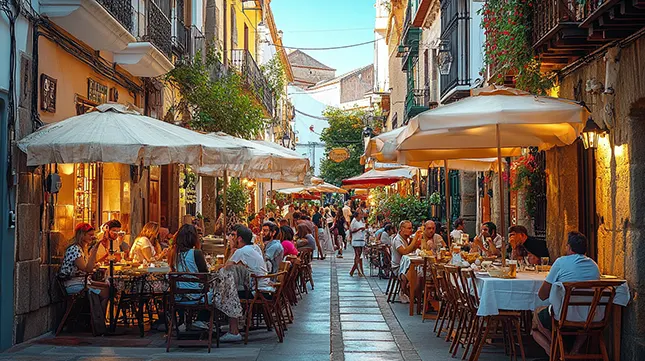Moving to Spain from the UK – 26 Things to Know in 2025

Are you thinking about moving to Spain from UK?
Spain has long been a dream destination for British expats, thanks to its warm climate, relaxed lifestyle, and affordable cost of living.
Though many people dream about escaping the UK’s endless winters, doing so takes time and effort, which puts many people off before they start.
However, despite Brexit, it is still doable.
You just need to jump over extra hoops to attain the dream. Here are plenty of reasons why, in the end, the hard work will be worth it!
Whether drawn by the golden beaches of the Costa del Sol, the vibrant cities like Madrid and Barcelona, or the charming countryside villages, Spain offers something for everyone.
Aside from the lifestyle benefits, Espanol provides excellent healthcare, a lower cost of living compared to the UK, and a culture that embraces family, social life, and leisure.
The country is also home to a large British expat community, making settling in and finding a support network easier.
If you are considering this exciting relocation, this guide will explain everything you need to know about moving to Spain from the UK in 2025.
1. Visa and Residency Requirements for UK Citizens

Understanding visa’s is a key part of your moving journey.
Since Brexit, UK nationals no longer have automatic freedom of movement in the EU.
If you are planning to move to Spain, you must apply for a visa or residency permit.
The Non-Lucrative Visa is a popular option for retirees.
This requires proving sufficient financial means to support yourself in Spain without working.
If you intend to work, you may need a Work Visa sponsored by a Spanish employer, or if you are self-employed, a Self-Employed Visa (Autónomo).
Wealthy individuals can apply for the Golden Visa, which grants residency to those investing at least €500,000 (£420,000) in Spanish property.
Once you obtain a visa, you must apply for a TIE (Tarjeta de Identidad de Extranjero), Spain’s foreigner identity card.
Residency permits must be renewed periodically.
Navigating Spain’s bureaucracy can be challenging, so consider hiring a gestor (administrative consultant) to help with the paperwork.
For official information on visa applications, visit the Spanish Consulate website
2. Post-Brexit Rules: Your Rights in Spain
Since Brexit, UK citizens no longer have automatic rights to live or work in Spain and must follow non-EU immigration rules.
Short Stays – UK passport holders can visit Spain for up to 90 days within a 180-day period without a visa. Longer stays require residency registration.
Living and working in Spain – to live in Spain long-term, you will need the right visa or permit. Options include:
Work visa – If you have a Spanish job offer.
Self-employment visa – If you plan to start a business.
Non-lucrative visa – Ideal for retirees or those with independent income.
Understanding these requirements is essential to avoid legal issues. Find up-to-date information on:
Spanish Ministry of Foreign Affairs
UK Government’s Living in Spain Guide
Planning ahead will ensure a smooth transition and compliance with Spain’s residency and employment laws.
3. Finding Your Ideal Location

Picking where you want to live isn’t easy with so many wonderful locations.
If you intend to live in Spain for the long term, where you choose to live could be the difference between make or break for your exciting new journey.
Everyone has different ideas, wants, and needs, so it’s vital to choose the right location for the first time.
All kinds of people emigrate to the country from young adults seeking an education in one of the country’s top universities, to those who want to hang up their boots and enjoy their golden years in warmer climes.
Here are some of the top spots that are particularly popular with UK expats:
Costa del Sol
Famous for its warm climate, golden beaches, and lively expat community, the Costa del Sol offers a mix of coastal towns like Marbella, Málaga, and Fuengirola. It boasts excellent golf courses, affordable property, and a relaxed Mediterranean lifestyle.
Alicante
Alicante is a vibrant coastal city with stunning beaches, a charming old town, and a bustling marina. Its international airport makes it convenient for UK travellers, while its affordable cost of living and year-round sunshine attract retirees and families alike.
Benidorm
A favourite among retirees, Benidorm is known for its lively atmosphere, beautiful beaches, and excellent healthcare. It has a well-established British community, making it easy for expats to settle in, with plenty of entertainment, restaurants, and social clubs.
Murcia
Murcia offers a quieter alternative to the Costa del Sol, with charming towns, lower property prices, and a relaxed pace of life. Expats love its traditional Spanish feel, excellent golf courses, and warm climate, making it ideal for retirement.
Mallorca
This stunning Balearic Island is a paradise for expats, offering breathtaking coastal views, a high quality of life, and excellent amenities. Palma, the capital, has a vibrant expat scene, with a mix of luxury living, culture, and laid-back island charm.
Torrevieja
A popular destination for British expats, Torrevieja offers affordable housing, stunning beaches, and a welcoming international community. The town has excellent healthcare services, a thriving social scene, and plenty of local markets, bars, and restaurants.
Barcelona
For those seeking a cosmopolitan lifestyle, Barcelona offers world-class culture, stunning architecture, and excellent job opportunities. The city attracts younger expats and professionals, boasting fantastic restaurants, a buzzing nightlife, and easy transport links to the UK.
If you haven’t already, it’s a good idea to visit each potential location to ensure it meets your expectations and lifestyle needs.
Take time to explore the neighbourhoods, chat with locals, and experience daily life firsthand.
This will give you a well-rounded perspective and help you make a confident, informed decision.
Relocating to a new country is a major step, so it’s essential to make the right choice from the outset!
4. Cost of Living in Spain Compared to the UK

You should expect some differences in living costs when making the move.
One of the biggest attractions of moving to Spain is the lower cost of living.
In fact, Numbeo, the cost-of-living website, states that Spanish residents enjoy a cost of living that is almost 40% lower than that of homeowners.
While prices vary depending on the region, everyday expenses such as rent, groceries, and dining out are generally cheaper than in the UK.
Housing costs can be significantly lower, especially outside major cities.
Renting a one-bedroom apartment in Madrid or Barcelona may cost between €800-€1,200 per month, whereas in smaller towns, rent can be as low as €400-€700.
Utilities, including electricity, water, and internet, are also more affordable, with fantastic savings as utilities are around 100% cheaper in Spain.
Groceries and dining out are other areas where you can save money.
A three-course meal at a mid-range restaurant in Spain typically costs around €50, compared to £80 in the UK.
Fresh produce, wine, and local meats are also more affordable, especially in local markets.
Mercadona is Spain’s largest supermarket chain, operating over 1600 stores countrywide.
Their website provides a true reflection of current costs, so take time to look at the cost of everyday grocery items.
However, salaries in Spain are lower than in the UK, so if you are moving for work, consider how your income will compare to living costs.
To get more information about daily living costs, check Numbeo’s cost of living comparison tool.
5. Spain – A Housing Market Overview

Be sure to enter the moving process with a good understanding of the housing market in Spain.
There are no restrictions for potential UK expats buying a home in Spain even after leaving the EU.
However, it is important to consider that you are only permitted to stay in Spain for 90 days within a 180-day period.
Once you have discovered precisely where you want to be, the next step is finding a suitable home.
How are the Spanish markets performing?
Spain’s property market continues to grow in 2025, with housing prices expected to rise by approximately 5% to 5.9%, driven by robust demand and limited supply.
Falling interest rates and sustained foreign investment further fuel this growth.
Now is a good time to buy with prices rising so fast.
The rental market is also experiencing some pressure, with rents reaching or surpassing record highs.
6. Accommodation in Spain – Renting a Home

Renting a property could be ideal for those making the move for the first time.
Deciding whether to buy or rent in Spain depends on your long-term plans.
Renting is a good option if you are unsure where you want to settle.
It offers you the opportunity to investigate and try several locations before you make the jump to Spanish property owners.
Furnished and unfurnished options exist, with furnished rentals being more common in expat-friendly areas.
Regarding cost, Spain is relatively affordable compared to the UK, even with rising rental charges, and generally landlords require lower deposits than in the UK.
Long-term rentals usually require a deposit of one to two months’ rent.
Contracts typically last 12 months, though some landlords offer shorter agreements.
Though location will significantly impact what you may pay per month as a tenant, some three-bedroom homes are available for as little as 1,100 (£923) in Arcos de la Frontera, Andalusia.
In Marbella you can expect to pay around the same per month for a one-bedroom apartment.
Websites like Idealista and Fotocasa are useful for finding rental properties and for providing financial insight so you can budget and plan more effectively.
If you want to know more about how to rent a home in Spain, fotocasa life has an invaluable guide.
7. Owning Your Spanish Dream Home

When the time comes to buy a home follow this advice.
Buying property in Spain as a British expat is straightforward, but it is essential to understand the legal and financial aspects before you start the process.
Buying a property can be a wise choice if you plan to stay long-term.
Property prices in Spain vary widely, with coastal areas and major cities being more expensive.
Buying property in Spain as a British expat is straightforward but requires careful planning and numerous steps:
- Get an NIE Number – A Número de Identificación de Extranjero (NIE) is required to buy property. Apply via the Spanish Consulate.
- Set a Budget & Secure Financing – Spanish banks offer 60-70% mortgages to non-residents. Compare options at Spanish Mortgage Advice.
- Find a Property – Use reputable portals like Idealista, Kyero, or Rightmove.
- Hire an Independent Lawyer – Ensure the property has no legal issues. Find one at Advocate Abroad.
- Make an Offer & Pay Deposit – Sign a Contrato de Arras and pay a 10% deposit to secure the property.
- Finalise Purchase at a Notary – The deed (Escritura de Compraventa) is signed, and ownership is officially transferred.
- Pay Taxes & Register Property – Expect 8-12% in taxes and fees. Register at the Land Registry (Registradores).
This is a brief overview of the property purchasing process. For an in-depth informative explanation, visit our guide, Buying Property in Spain as a Foreigner from the UK.
Hiring a local property lawyer is recommended.
8. Using a Gestor in Spain
If you are feeling overwhelmed by the Spanish property market protocol, you should consider hiring a Gestor.
A Gestor in Spain is an administrative specialist who helps individuals and businesses navigate Spanish bureaucracy.
They handle paperwork, permits, taxes, and legal processes, making them especially useful for expats unfamiliar with Spain’s system.
While a Gestor is not a lawyer, they are highly knowledgeable about administrative procedures and can assist with:
- Residency applications & NIE numbers
- Property purchases & tax filings
- Vehicle registrations & driving licenses
- Business setup & self-employment paperwork
Using a Gestor can save time and stress with numerous issues, ensuring paperwork is completed correctly.
Many expats hire one for ongoing support with Spanish bureaucracy.
Finding a reputable Gestor is easy, visit the Colegio de Gestores Administrativos’s website.
By staying informed and seeking professional assistance, you can confidently navigate the Spanish property market and find your ideal home in this beautiful country.
9. Where are the Cheapest Places to Live in Spain

You may want to consider moving to one of these locations.
All countries have towns that tend to be cheaper than others, and for bargain-hunting UK expats, there are numerous places in Spain where you can own a home without breaking the bank.
Here are the top six cheapest locations currently:
Lugo (Galicia)
- Average Property Price: Approximately €1,136 (£953) per square metre.
- Affordability Insights: Lugo’s property market remains affordable due to its cooler climate and limited tourism compared to other Spanish regions, resulting in lower demand and housing costs.
Zamora (Castilla y León)
- Average Property Price: Around €1,119 (£939) per square metre.
- Affordability Insights: Zamora’s lower population density and limited industrial activity contribute to its affordable housing market.
Cáceres (Extremadura)
- Average Property Price: Approximately €1,245 (£1045) per square metre.
- Affordability Insights: Cáceres offers affordable housing due to its location in one of Spain’s less developed regions, leading to lower property prices.
Jaén (Andalusia)
- Average Property Price: Around €1,034.5 (£868 per square metre.
- Affordability Insights: Jaén’s economy, primarily based on agriculture, and its inland location contribute to its lower property prices compared to coastal Andalusian cities.
Teruel (Aragón)
- Average Property Price: Approximately €1,029.6 (£864) per square metre.
- Affordability Insights: Teruel’s low population density and limited tourism keep housing demand and prices low.
Castellón de la Plana (Valencian Community)
- Average Property Price: Around €897.7 £754) per square metre. CEIC Data
- Affordability Insights: Despite its coastal location, Castellón de la Plana remains affordable due to lower international demand than other Spanish coastal cities.
Please note that property prices can vary based on specific locations within these areas and the property type.
10. Choosing a Dependable Estate Agent in Spain

Having the help of a local estate agent will make the buying process a lot easier.
Finding a trustworthy estate agent is essential when buying property in Spain.
To ensure credibility, look for registered agents affiliated with reputable organizations like the API (Agentes de la Propiedad Inmobiliaria) or AIPP (Association of International Property Professionals).
Before committing, research reviews, request client references, and confirm they specialise in working with expats.
A good agent should provide transparent advice, assist with paperwork, and guide you through the legal process.
Plus, they have insider knowledge about specific areas that more prominent agents lack.
A final word of advice, avoid agents who pressure you into quick decisions or lack proper documentation.
Finding the right professional will make your property purchase smooth and stress-free.
11. Open a Spanish Bank Account

You will need to make sure you have a Spanish bank account when moving here.
Opening a Spanish bank account makes managing finances easier, especially for paying bills, rent, and taxes.
Major Spanish banks include Santander, BBVA, CaixaBank, and Sabadell.
To open an account, you will typically need a valid passport, proof of address, NIE number, and in some cases, proof of employment or income.
Some banks offer non-resident accounts, which may have higher fees but allow you to bank in Spain without full residency status.
Online banking is widely used, with mobile apps providing easy access to transactions and bill payments.
For money transfers, services like Wise (formerly TransferWise), Revolut, and PayPal offer cost-effective ways to send money between the UK and Spain.
Many expats maintain dual UK and Spanish bank accounts to manage finances efficiently.
Before moving, research the best banks for expats at www.bankinter.com.
12. Employment Opportunities in Spain

There are a wide range of jobs available in the country.
While many UK expats arrive to retire or study, as many want to find employment in Spain.
It is good to know that Spain’s employment market is experiencing significant growth, positioning it as one of Europe’s leading economies.
In 2024, Spain’s GDP grew by 3.2%, outpacing many European counterparts.
Having skills that are highly sought after will enhance your visa application.
Some of the most in-demand sectors and roles currently include:
Information and Communication Technology (ICT): The ICT sector has grown substantially, with a turnover reaching €120 billion in 2022.
Artificial Intelligence (AI): AI specialists are sought after as Spain invests heavily in digital transformation.
Cybersecurity: With the increasing importance of data protection, cybersecurity experts are in high demand.
Cloud Computing: Cloud engineers and specialists are needed to support the growing digital infrastructure.
Healthcare: An aging population has led to a continuous need for healthcare professionals, including doctors, nurses, and health and welfare managers.
Engineering: Civil, mechanical, and electrical engineering roles remain essential, driven by infrastructure projects and renewable energy initiatives.
Education: There is a consistent demand for educators, especially English language instructors, due to Spain’s focus on bilingual education.
Tourism and Hospitality: As a top tourist destination, Spain requires professionals in hotel management, event planning, and customer service to support its robust tourism industry.
13. Salary Expectations
When considering employment opportunities in Spain and the UK, it is essential to understand the differences in average salaries, which are influenced by various factors such as industry, experience, and location.
Average Salaries in Spain
As of 2024, the average gross annual salary in Spain is approximately €26,950, (£22,629) equating to about €2,245 (£1,885) per month. However, salaries can vary significantly depending on the region.
According to: Relocate
- Madrid: The capital city offers higher average salaries, ranging from €35,000 to €40,000 per year (£29,400 – £33,588) reflecting its status as a major economic hub.
- Barcelona: In this metropolis, the average monthly salary is around €3,130 (£2,628) translating to an annual income of approximately €37,560 (£31,540)
It is important to note that while these figures provide a general overview, individual salaries can vary based on qualifications, experience, and specific industries.
These statistics may indicate that salaries are lower in Spain but as the cost of living in Spain is generally lower, it potentially balances out the differences in income.
14. Taxes and Social Security
Understanding the Spanish tax system is crucial for expats.
Spain operates on a progressive tax system, meaning the more you earn, the higher the tax rate.
If you reside in Spain for more than 183 days in a calendar year, you are considered a tax resident and must declare your worldwide income.
Key taxes include income tax (IRPF), which ranges from 19% to 47%, property tax (IBI) for homeowners, and wealth tax, applicable if your assets exceed a certain threshold.
The UK and Spain have a double taxation treaty, so you will not be taxed twice on the same income.
Like the UK’s National Insurance system, expats working in Spain contribute to social security, which funds healthcare, pensions, and unemployment benefits.
For the self-employed, you must register as an autónomo and pay a monthly social security fee.
For up-to-date tax guidance, consult www.agenciatributaria.es.
15. Spain’s Work-Life Balance: A Lifestyle to Enjoy

Perhaps one of the biggest benefits of moving here is the work life balance.
One of the most significant advantages of working in Spain is the strong emphasis on work-life balance.
Unlike the UK, where long hours are typical, many Spanish companies prioritise employee well-being.
Horario intensivo (intensive working hours) is a great example.
During summer, employees often start earlier and finish by 2 or 3 PM, giving them more time to enjoy the sunshine, socialize, or relax.
This flexibility reflects Spain’s “work to live” mentality rather than the high-pressure culture found in some other countries.
Long lunch breaks, a strong focus on family life, and a slower daily pace contribute to a better quality of life.
Spain’s work culture also offers generous holiday allowances, with a minimum of 30 days of paid leave per year.
With vibrant cities, beautiful beaches, and a relaxed lifestyle, it is easy to see why so many expats choose to live and work here.
16. Money Transfers to Spain
When relocating to Spain, you need a cost-effective way to transfer money and manage currency exchange.
The official currency in Spain is the Euro (€), and major retailers, restaurants, and hotels widely accept Visa and MasterCard.
However, securing the best exchange rate is crucial if you need to transfer large sums, such as to buy a property or cover long-term expenses.
Many people automatically use their high street bank to transfer money, but banks often charge higher fees and offer less favourable exchange rates.
This means you could lose hundreds or even thousands on large transactions such as a house purchase.
Instead, consider using a foreign exchange (FX) specialist. These companies offer:
- Better exchange rates than banks
- Lower transfer fees
- Faster processing times
- Rate-locking options to secure a good deal.
White & Company has an exclusive partnership with Currencies Direct, offering preferential exchange rates and potential savings on international money transfers.
To explore your options and see how much you could save, follow this link: Currencies Direct.
By choosing an FX company over a bank, you can maximise your savings and ensure the best possible return on your money when moving to Spain.
17. Transportation in Spain

You will find some excellent transport options are available to you when moving to Spain.
Spain has an efficient and affordable transportation system, making it easy to travel between cities.
The AVE high-speed train connects Madrid, Barcelona, Valencia, and Seville in just a few hours.
For local travel, metros, buses, and trams are widely available in major cities, with a monthly transport pass costing around €40–€55.
For details on public transport, visit www.renfe.com and www.metromadrid.es.
Driving in Spain requires a valid UK driving licence, which must be exchanged for a Spanish one after six months of residency.
The cost of petrol is lower than in the UK, but toll roads (autopistas) can be expensive.
Public parking is scarce in city centres, and many residents rely heavily on public transport.
For long-distance travel, budget airlines like Vueling, Ryanair, and Iberia Express offer cheap flights between Spanish cities and across Europe.
Spain’s transport system is reliable, making car ownership unnecessary for many expats.
18. Weather and Climate

You can expect an upgrade from the UK when it comes to the weather.
Spain enjoys diverse climates, ranging from Mediterranean to oceanic and continental.
The Costa del Sol, Alicante, and Murcia enjoy over three hundred sunny days yearly, with hot summers exceeding 35°C and mild winters averaging 12–18°C.
In contrast, Madrid experiences hot, dry summers and cold winters, with occasional snowfall.
Northern Spain, including Bilbao, San Sebastián, and Galicia, has a cooler, rainier climate, like the UK.
If you prefer moderate temperatures, the Canary Islands offer spring-like weather year-round, making them popular among retirees.
Before moving, consider how climate affects your lifestyle.
Areas with extreme summer heat require air conditioning, while northern regions may require central heating.
Spain’s varied weather means there is a perfect region for everyone, whether you love sunny beaches or lush green landscapes.
19. Safety and Security in Spain
Spain is generally a safe country, ranking among the safest in Europe.
Violent crime is low, but petty theft, such as pickpocketing, can occur in busy tourist areas like Barcelona’s Las Ramblas and Madrid’s Puerta del Sol.
Always be mindful of your belongings, especially in crowded public transport.
The Spanish emergency number is 112, which connects to police, medical services, and firefighters.
Spain has a visible police presence, with both local police (Policía Local) and national forces (Guardia Civil, Policía Nacional) ensuring public safety.
In residential areas, gated communities and alarm systems add extra security, which is often the case in purpose-built retirement villages.
For expats, community forums and local expat groups provide valuable safety tips.
Spain’s commitment to public safety makes it a comfortable place for families, retirees, and visitors.
20. Healthcare in Spain: Public and Private Options

Make sure you are up to speed with how healthcare services work in Spain.
Spain has one of the best healthcare systems in the world, offering both state-funded (public) healthcare and private medical care.
The system is known for its high standards, modern facilities, and well-trained professionals.
Public Healthcare (Sistema Nacional de Salud – SNS)
Spain’s public healthcare system is universal and essentially free at the point of use for residents.
It is funded through social security contributions, meaning if you work and pay taxes in Spain, you are entitled to free or low-cost healthcare.
EU citizens with an EHIC or GHIC card can also access treatment for short stays.
Non-EU residents, including British expats post-Brexit, must either register for public healthcare (if eligible) or take out private insurance.
Wait times in the public system can be long, especially for specialists or non-urgent procedures.
Private Healthcare
Many expats and residents opt for private healthcare to access faster appointments, English-speaking doctors, and shorter wait times.
Private insurance costs between €50 (£42) €200 (£168) per month, depending on age and coverage.
Popular providers include:
Private health insurance is also required for many visa and residency applications. In most cases you can transfer to the public system when/if you become a permanent resident.
21. Understanding Education in Spain for Expat Families

If you are moving with children you need to have a good understanding of the schooling system.
If you are moving to Spain with children, ensuring they receive a high-quality education is a top priority.
Spain’s education system, governed by the Ley Orgánica de Educación (LOE), guarantees free schooling for children aged 6 to 16 in public schools.
Families who plan to stay in Spain long-term often choose Spanish public schools, which provide free education and help children integrate into the local culture and language.
For those staying short-term or seeking an English-language education, international schools are a popular choice.
These schools follow curricula such as the British A-Levels, International Baccalaureate (IB), or the Spanish Bachillerato, making transitions smoother for expat students.
The Bachillerato is Spain’s equivalent to UK A-Levels and prepares students for university or vocational training.
If your child is in secondary school, understanding this system will help them plan their future studies.
International school fees vary, depending on the institution, from €2,500 to over €10,000 per year.
These schools offer smaller class sizes, modern facilities, and diverse extracurricular activities, ensuring a well-rounded education.
For more details on the Spanish education system and a list of schools, visit the Ministry of Education’s official website.
Choosing the right schooling option will help your child settle in and thrive in Spain.
22. Breathtaking Natural Wonders

Spain is a truly gorgeous country.
While Spain is world famous for its golden beaches and historic cities, its diverse natural landscapes are just as captivating.
From snow-capped mountains to volcanic wilderness, the country is filled with breathtaking scenery waiting to be explored.
In northern Spain, Somiedo Natural Park, often called the “Spanish Yellowstone,” is a remote haven of lush valleys, glacial lakes, and rich wildlife, including the elusive Cantabrian brown bear.
This protected area offers spectacular hiking routes through untouched nature.
Further south, in Andalusia, Cabo de Gata-Níjar Natural Park showcases a volcanic landscape with otherworldly rock formations, hidden coves, and crystal-clear waters.
Nearby, the Sierra del Cabo de Gata rises dramatically from the Mediterranean, boasting towering cliffs and panoramic coastal views.
These are just a few of Spain’s incredible natural treasures. Whether you are an adventurer, hiker, or nature lover, exploring Spain’s wild side will leave you in awe.
So, if you are moving to or visiting Spain, make sure to venture beyond the cities, there is a whole world of natural beauty waiting to be discovered!
23. Learning Spanish is Essential for Life in Spain
If you are planning to move to Spain, learning at least basic Spanish will make your life significantly easier.
While many expats manage without fluency, relying solely on English can be limiting, especially outside major cities.
A 2017 CIS State Research Institute poll found that almost 60% of Spaniards do not speak English.
This means that day-to-day tasks like shopping, setting up utilities, or visiting the doctor can become much more challenging if you do not speak the language.
In larger cities like Madrid, Barcelona, or Valencia, you will find more English speakers, but in smaller towns and rural areas, you may have to rely on hand gestures and Google Translate.
Bear in mind that as many as sixteen different languages are spoken in the country, so check which language your region speaks before you start learning.
The good news is that Spanish is one of the easiest languages for English speakers to learn due to its shared Latin roots, simple pronunciation rules, and regular grammar structures.
Even picking up key phrases can make a significant difference in helping you integrate, build relationships, and navigate life in Spain with confidence.
To get started, consider language apps like Duolingo, Rosetta Stone, or BBC Languages.
Taking local Spanish classes or practicing with native speakers will also help you adapt faster and make your experience far more enjoyable.
24. Embracing Spain’s Unique Culture: What to Expect

There are some clear cultural differences between Spain and the UK.
Moving to Spain is not just about a location change, it is about adapting to a different way of life.
Understanding Spanish customs will help you settle in more smoothly and appreciate the laid-back lifestyle that defines the country.
One of the most significant cultural adjustments for newcomers is Spain’s daily rhythm.
Mornings (“la mañana”) extend until around 2 PM, after which many people take a long lunch break, often lasting up to two hours.
This “siesta” culture means that many small businesses, shops, and offices close in the afternoon, which can be frustrating if you are used to a non-stop workday.
The day then resumes in the evening (“la tarde”), with dinner often as late as 9 or 10 PM.
August is another key cultural shift to be aware of.
It is Spain’s primary holiday month, and many businesses, especially in smaller towns, shut down while locals head to the beach or countryside.
If you plan to move, buy property, or arrange official paperwork, avoid August, as you may face significant delays.
Adapting to these cultural differences will enrich your experience and help you easily integrate into Spanish life.
25. Moving to Spain with Pets: What You Need to Know

Following all of the rules is vital when moving with a pet.
Relocating to Spain with your pet requires careful planning to ensure a smooth and stress-free transition.
Meeting Spain’s import requirements and ensuring your pet’s well-being during the journey should be top priorities.
Key Requirements:
- Age & Vaccination: Pets under three months old without the required vaccinations cannot enter Spain. Plan vaccinations well in advance of your move.
- Microchipping: Your pet must be fitted with an ISO 11784/11785 compliant 15-digit microchip before or when receiving a rabies vaccination.
- Rabies Vaccination: If vaccinated after being microchipped, you must wait 21 days before travel.
- EU Pet Passport or Veterinary Certificate: This document must show rabies vaccination records and microchip details.
Consult your vet to ensure all vaccinations are up to date and to discuss any additional health precautions for traveling with pets.
For official guidelines, visit the Blue Cross, which provides the latest post-Brexit pet travel regulations and helpful pet relocation tips.
For more practical advice and personal experiences, check out our blog post on moving abroad with pets, ensuring your furry companion settles comfortably into their new Spanish home.
26. Spanish Customs Regulations
Before your personal belongings can be imported into Spain, they will undergo a customs check.
This is to ensure that you have not accidentally imported anything that is considered prohibited, here is a list of restricted items you should be aware of:
- Tobacco and Alcohol: There are strict limits on the amount you can bring in.
- Illegal Drugs: Any form of illegal drugs is prohibited.
- Animal Skins: Certain animal skins are not allowed.
- Specific Food Items: Items such as beetroot and mustard seeds are restricted.
- Plants: Must have a phytosanitary certificate to be imported.
- Unlicensed Sports Guns: These are not permitted.
- Telecommunications Equipment: Certain types may be restricted.
- Large Sums of Money: Any funds exceeding €10,000 must be declared to customs authorities.
You can download a copy of the full Spanish import regulations here.
Moving Your Belongings to Spain: Choosing the Right Removal Service

When relocating to Spain, road transport is the most popular and practical method for shipping household goods.
Choosing a reputable removal company with international experience is key to ensuring a successful relocation.
Most removal companies offer two main options: full load and part load services.
Full Load Service: This premium option involves transporting all your belongings in a dedicated vehicle, ensuring faster delivery and a set arrival date. It is ideal for those who need a quick and direct move, though it comes at a higher cost.
Part Load Service: A more budget-friendly choice, where your items share space with other customers’ goods. The vehicle only departs once it is fully loaded, leading to longer transit times but significant cost savings. This is best for those with flexible moving dates.
A trusted removal company will handle potential challenges, such as moving large furniture, securing parking permits, and navigating customs regulations.
They also ensure your belongings are transported safely, providing expert packing services and advice on required customs paperwork.
For a reliable and experienced moving service, White & Company specialises in international removals to Spain, ensuring your relocation is seamless and hassle-free.
White & Company are also founder members of the removal industry regulator, the British Association of Removers (BAR), which gives you added protection and security.
Let us take the stress out of moving, our experienced team ensures a smooth and hassle-free transition.
For more information, call us on 01489 663018 or fill out our quick quote form, and we will contact you soon.
Trust White & Company to deliver your possessions safely, securely, and on time, so you can focus on settling into your new life in Spain.

Max is a seasoned writer and blogger in the real estate and home moving sectors, as well as a knowledgeable source of information for expatriates living and working abroad. His detailed insights have helped thousands of people move and live abroad with greater simplicity and ease.
Posted in: News
Leave a Comment (0) ↓


